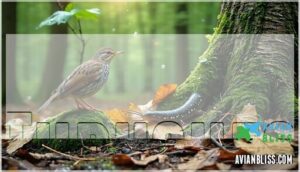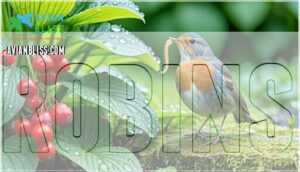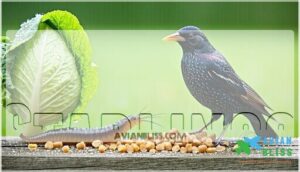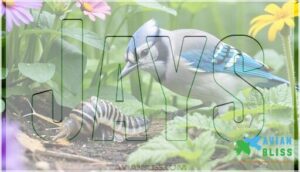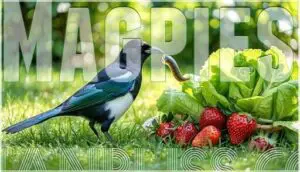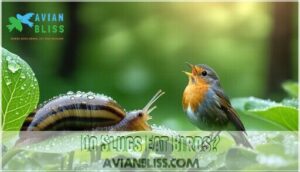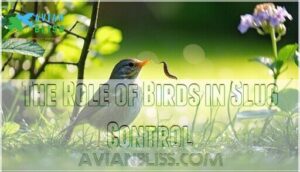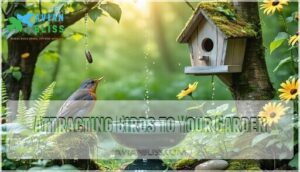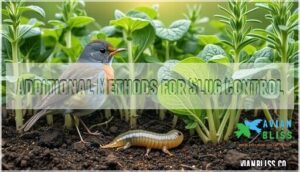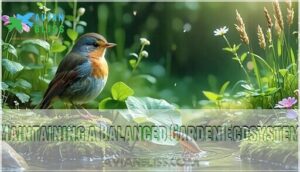This site is supported by our readers. We may earn a commission, at no cost to you, if you purchase through links.
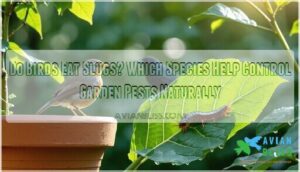
You’ll find thrushes, robins, starlings, and blackbirds hunting these slimy garden visitors with surprising enthusiasm. These feathered friends use their sharp beaks to grab slugs from leaves, soil, and hiding spots around your garden.
Slugs provide birds with essential proteins, fats, and nutrients they need for energy and growth. It’s like nature’s own pest control system working in your backyard.
Birds typically swallow smaller slugs whole, while larger ones get broken into manageable pieces. Understanding which specific bird species are most effective slug hunters can transform your garden into a natural battleground.
Table Of Contents
- Key Takeaways
- Why Do Birds Eat Slugs?
- Which Birds Eat Slugs?
- How Do Birds Eat Slugs?
- Do Slugs Eat Birds?
- The Role of Birds in Slug Control
- Attracting Birds to Your Garden
- Additional Methods for Slug Control
- Maintaining a Balanced Garden Ecosystem
- Frequently Asked Questions (FAQs)
- What is the main predator of slugs?
- How do I permanently get rid of slugs?
- Are garden slugs good for anything?
- What do slugs hate most?
- Are slugs nutritionally beneficial for birds?
- Can slug pellets harm birds that eat slugs?
- Do different bird beaks affect slug consumption?
- Which slugs are dangerous for birds to eat?
- How do birds find slugs in gardens?
- Conclusion
Key Takeaways
- You can rely on thrushes, robins, starlings, and blackbirds as natural slug hunters that’ll consume hundreds of these garden pests throughout the breeding season, providing effective biological pest control without chemicals.
- You’ll find slugs offer birds essential nutrition with 18 grams of protein per serving plus calcium and iron, making them an irresistible protein-packed snack that supports healthy feather development and bone strength.
- You can attract these helpful slug-eating birds by creating bird-friendly gardens with native plants, shallow water sources like birdbaths, and natural shelter options while avoiding pesticides that disrupt the food chain.
- You’ll get the best results by combining bird attraction with other natural methods like copper tape barriers, diatomaceous earth, and companion planting to create a comprehensive, eco-friendly slug control system.
Why Do Birds Eat Slugs?
Birds eat slugs for several compelling reasons that make these slimy garden dwellers irresistible targets.
These feathered pest controllers turn your slug problem into their protein-packed feast.
From a nutritional standpoint, slugs pack impressive protein content—about 18 grams per 4-ounce serving—along with essential calcium and iron that support healthy feather development and strong bones.
This nutritional benefit makes slugs a diet birds particularly value during breeding season when energy demands peak.
Slugs also serve as an excellent hydration source, especially during hot summer months when water becomes scarce.
Their high moisture content helps birds meet daily fluid requirements while hunting for food.
These garden pests represent easy prey for most bird species, as slugs move slowly and can’t escape quickly, making them perfect targets for birds that eat garden pests naturally.
Habitat factors play a vital role too—slugs prefer the same moist, sheltered areas where many birds forage.
Most importantly, this instinctual behavior reflects millions of years of evolution, making slug predators essential partners in maintaining balanced garden ecosystems.
Which Birds Eat Slugs?
You’ll find several common bird species that actively hunt slugs in your garden, including thrushes, robins, starlings, jays, and magpies.
These natural pest controllers use their specialized beaks and foraging techniques to locate and consume slugs, making them valuable allies for gardeners seeking chemical-free slug management.
Thrushes
Song thrushes and mistle thrushes from the Turdidae family rank among nature’s most effective slug predators.
These speckled birds eat slugs by smashing them against rocks, making consumption easier. You’ll spot thrushes systematically hunting through leaf litter and moist soil where slugs hide.
Their thrush behaviors include ground foraging that naturally controls garden pests.
Thrush habitats span woodlands to suburban gardens, while their thrush diets incorporate slugs as essential protein. Mistle thrushes also eat invertebrates and berries.
Supporting thrush conservation through bird-friendly gardens helps maintain these valuable slug-eating allies in your outdoor spaces.
Robins
When you spot a robin hopping across your lawn, you’re watching nature’s pest control in action.
These garden birds slugs love to hunt make up 80% of their diet from insects and invertebrates, including those slimy garden destroyers. Robins are omnivorous, and their diet also includes red fruit options.
Robin foraging techniques include:
- Standing still to listen for prey movement
- Searching under leaves and soil debris
- Hunting in open areas with high slug populations
- Adapting seasonal feeding patterns for survival
Starlings
When you’re battling garden slugs, starlings make excellent allies with their opportunistic foraging behavior. These intelligent birds eat slugs as part of their diverse diet, consuming up to 23 grams of animal matter daily.
Urban starlings adapt well to residential areas, making them valuable for natural slug control.
Here’s how to attract these helpful pest controllers:
- Provide shallow water sources like birdbaths for drinking
- Offer cracked corn and mealworms near garden beds
- Install tall perches for better garden observation
- Create mulched areas where slugs naturally gather
- Maintain open lawn spaces for ground foraging
Jays
Intelligence meets appetite when jays patrol your garden for slugs.
These clever corvids demonstrate remarkable Jay Behavior through opportunistic feeding, making them excellent natural pest control allies.
Jay Diet includes protein-rich mollusks alongside their preferred acorns and seeds.
Garden Jays adapt their Jay Predation techniques to hunt soft-bodied gastropods hiding in vegetation.
Their diverse Jay Habitat preferences mean they’ll visit various garden areas, ensuring thorough slug management while birds eat garden pests naturally.
They are excellent allies in natural pest control, helping to manage slug populations effectively.
Magpies
These clever corvids pack a punch in the area of natural pest control. Magpies keenly hunt slugs as part of their diverse diet, using their intelligence and opportunistic foraging habits to locate these garden pests.
Their social behavior and habitat impact make them valuable allies.
- Sharp beaks pierce through slug defenses
- Opportunistic hunting reduces pest populations
- Intelligence helps locate hidden garden invaders
- Social groups coordinate effective foraging strategies
Their ability to hunt and reduce pest populations is a significant benefit, making them a valuable asset in the garden, particularly with their opportunistic foraging habits.
How Do Birds Eat Slugs?
Different bird species have developed fascinating techniques for consuming slugs that showcase remarkable beak adaptations.
When birds eat slugs, they employ various strategies depending on their size and hunting style.
Here are three primary methods birds use to consume these garden pests:
- Swallowing whole – Smaller birds like robins gulp down tiny slugs without any preparation, making this the quickest feeding method.
- Smashing slugs – Thrushes demonstrate impressive skill by smashing slugs against rocks or hard surfaces, breaking down their slimy bodies before consumption.
- Chewing slugs – Larger birds use probing techniques with their beaks to pierce and chew slugs thoroughly, extracting maximum nutrition.
These natural slug control birds help maintain your garden’s balance while adding their own nutrients through droppings, creating a win-win situation for gardeners.
Do Slugs Eat Birds?
You might wonder if slugs diet birds in reverse predation scenarios.
The answer is no. Slugs are herbivorous mollusks that feed on decaying plant matter, fungi, and fresh vegetation.
They lack the physical capability to hunt or consume birds of any size.
Bird vulnerability to slugs simply doesn’t exist due to fundamental biological differences.
While habitat overlap occurs in gardens and forests where both species coexist, slug defense mechanisms focus on avoiding predators rather than attacking them.
Birds eat slugs regularly, but slug bird predation never happens naturally, and this is due to the fact that slugs are not capable of attacking them.
The Role of Birds in Slug Control
Birds eat slugs and provide remarkable natural pest control benefits that transform your garden ecosystem.
When you encourage slug-eating birds like thrushes, robins, and starlings to visit your yard, you’re creating a powerful biological defense system.
These feathered allies consume hundreds of slugs throughout the breeding season, dramatically reducing garden pest control needs.
Natural predation offers significant economic advantages over chemical treatments.
You’ll spend less money on pesticides while supporting biodiversity in your outdoor space.
Birds maintain ecological balance by controlling slug populations before they damage your plants.
This ecosystem approach reduces pesticides in your soil and protects beneficial insects.
The environmental benefits extend beyond slug management.
Bird-based pest control creates a self-sustaining cycle where healthy bird populations naturally regulate harmful pest numbers, promoting overall garden health.
Attracting Birds to Your Garden
Creating a bird-friendly garden transforms your outdoor space into a natural pest control system. When you design with intention, birds eat slugs and provide effective garden pest control without chemicals.
Transform your garden into nature’s pest control headquarters—where birds become your slug-fighting allies through thoughtful design.
Your garden birds need three essentials: food, water, and shelter. Here’s your blueprint for bird attraction:
- Native Plants: Choose coneflowers, asters, and black-eyed susans that produce seeds and berries year-round
- Water Sources: Install heated birdbaths near protective shrubs for drinking and bathing stations
- Shelter Options: Build brush piles from pruned branches and install species-specific nest boxes
Bird feeders filled with seeds and mealworms attract ground-feeding species like robins and blackbirds. You can find native plants for birds at many online retailers.
Avoiding pesticides protects the natural food chain that supports these helpful hunters. Let flower heads go to seed naturally – this simple step creates winter food sources while maintaining your bird-friendly garden’s ecosystem.
Additional Methods for Slug Control
Beyond encouraging bird predation, you’ll want multiple slug control strategies working together for maximum garden protection.
Slug traps baited with beer catch breeding adults before they multiply, while copper tape creates electrical barriers around vulnerable plants. Diatomaceous earth acts like microscopic glass shards, cutting slugs as they crawl across treated areas.
Here are four effective companion methods to boost your natural slug control:
- Apply nematodes – These beneficial microscopic worms infect slugs with bacteria, providing targeted biological control
- Install copper tape barriers around raised beds and individual plants for long-lasting protection
- Scatter diatomaceous earth in dry conditions around slug-prone areas for physical deterrence
- Practice companion planting with slug-resistant herbs like rosemary and thyme near susceptible vegetables
Combining these approaches with natural predators creates thorough garden protection. Similarly, you can use diatomaceous earth to protect birds from parasites.
Maintaining a Balanced Garden Ecosystem
When you provide ample food, shelter, and water sources, you’re building a natural pest control network that keeps garden ecosystems thriving.
Your garden becomes a haven where birds eat slugs alongside other natural predators like beetles and ground-dwelling insects. Focus on habitat diversity by planting native plants that attract beneficial wildlife while supporting vulnerable vegetables.
Create bird-friendly practices through strategically placed woodpiles, tall grasses, and water sources like birdbaths that draw robins and thrushes to feast on slugs in garden beds. To further enhance the environment, consider planting native trees for nesting sites.
This approach nurtures complex relationships between soil organisms, insects, and wildlife that naturally regulate pest populations. Skip the chemical shortcuts that harm beneficial creatures. Instead, let these interconnected relationships maintain balance through predation, creating a self-sustaining garden ecosystem where every creature plays its part in controlling unwanted pests.
Frequently Asked Questions (FAQs)
What is the main predator of slugs?
Picture countless feathered hunters swooping down like nature’s cleanup crew.
You’ll find birds are slugs’ primary predators, with thrushes, robins, and ducks leading the charge in this endless garden battle for survival.
How do I permanently get rid of slugs?
You can’t completely eliminate slugs forever, but you’ll drastically reduce their numbers by removing hiding spots, using copper barriers, encouraging natural predators like birds, and applying organic deterrents consistently.
Are garden slugs good for anything?
Garden slugs aren’t just slimy pests – they’re nature’s recycling crew, breaking down dead plants into rich soil nutrients.
They also feed birds like thrushes and robins, supporting your backyard’s natural food web.
What do slugs hate most?
Slugs absolutely despise salt, coffee grounds, crushed eggshells, and copper barriers.
They’ll also avoid diatomaceous earth, garlic spray, and aromatic herbs like rosemary.
These natural deterrents create uncomfortable textures and scents that keep slugs away from your plants, using natural deterrents.
Are slugs nutritionally beneficial for birds?
Like medieval knights feasting on hearty fare, you’ll find slugs pack serious nutritional punch for birds.
They’re protein powerhouses delivering eighteen grams per serving, plus calcium for strong bones and essential vitamins supporting overall health.
Can slug pellets harm birds that eat slugs?
Yes, slug pellets can seriously harm birds that eat poisoned slugs.
Metaldehyde in these pellets is toxic to wildlife.
You’ll protect your feathered friends by choosing natural slug control methods instead.
Do different bird beaks affect slug consumption?
Form follows function," and bird beaks perfectly demonstrate this principle.
You’ll notice straight, thin beaks provide pinpoint accuracy for catching slugs, while curved beaks grasp larger ones effectively, determining each species’ slug-eating success.
Which slugs are dangerous for birds to eat?
Giant slugs can be poisonous and dangerous for birds to consume.
You’ll also want to avoid slugs that have eaten slug pellets containing metaldehyde, as this chemical is toxic to birds.
How do birds find slugs in gardens?
Birds employ their refined hunting instincts to locate these garden pests through multiple sensory approaches.
They’ll probe moist soil, flip leaves, search dense ground cover, and follow slime trails.
You’ll notice them foraging during dawn when slugs are most active.
Conclusion
Ready to transform your garden into a natural pest-control paradise?
Birds that eat slugs offer an eco-friendly solution that’s both effective and sustainable.
By attracting thrushes, robins, starlings, and other slug-hunting species to your yard, you’ll reduce harmful pest populations while supporting local wildlife.
Create bird-friendly spaces with water sources, native plants, and shelter options.
Remember, when you ask "do birds eat slugs," the answer benefits both your garden’s health and the environment’s delicate balance.
- https://thebirdisearly.com/discover-which-birds-are-natural-slug-predators-and-how-to-attract-them-to-your-garden/
- https://academic.oup.com/jipm/article/3/1/C1/808026
- https://birdsinthetree.com/what-birds-at-slugs/
- https://www.online-field-guide.com/animals-that-eat-slugs/
- https://birdwatchingbuzz.com/do-birds-eat-slugs/

